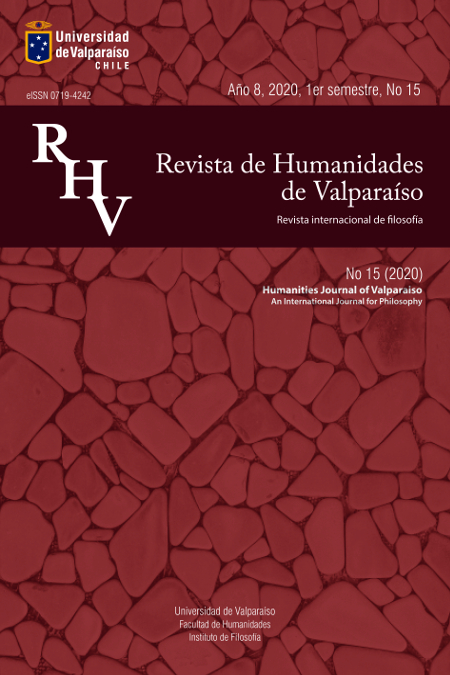La propuesta ética de William David Ross
DOI:
https://doi.org/10.22370/rhv2020iss15pp41-64Palabras clave:
Ética, deontologismo, intuicionismo, filosofía analítica, utilitarismoResumen
El presente trabajo procura analizar la filosofía moral de William David Ross. En primer lugar, se exponen los precedentes de la ética de Ross, centrándose en tres autores contra los que él mismo reconoce entrar en discusión: Kant, los utilitaristas y Moore. A ello se dedicará el segundo capítulo. Seguidamente, se explica la propuesta de Ross a través de tres ejes: 1) la teoría del conocimiento moral, en donde aparecerá su conocida teoría intuicionista; 2) la doctrina de la corrección, compuesta por el pluralismo deontológico; 3) y la doctrina del bien, en donde se sitúa su axiología. A todo ello se dedicarán los tres siguientes capítulos, respectivamente. Por último, se proponen media docena de conclusiones.
Descargas
Referencias
Aristóteles (2005). Ética a Nicómaco. Alianza: Madrid.
Audi, R. (2005). The Good in the Right: A Theory of Intuituion and Intrinsic Value. Princeton: Princeton University Press.
Beauchamp, T., Childress, J. (2001). Principles of Biomedical Ethics. Oxford: Oxford University Press.
Brentano, F. (2013). El origen del conocimiento moral. Madrid: Tecnos.
Broad, C. D. (1940). Critical Notice of W. D. Ross “Foundations of Ethics”. Mind, 49: 228-239. http://www.ditext.com/broad/ross.htm
Curry, O., Mullins, D., Whitehouse, H. (2019). Is It Good to Cooperate? Testing the Theory of Morality-as-Cooperation in 60 Societies, Current Anthropology, 60(1): 47-69. doi: https://doi.org/10.1086/701478
DePaul, M., Hicks, A. (2016). A Priorism in Moral Epistemology, The Stanford Encyclopedia of Philosophy. https://plato.stanford.edu/archives/fall2016/entries/moral-epistemology-a-priori/
García-Yzaguirre, J.V. (2012). La validez prima facie y el principio de derrotabilidad de las normas jurídicas. Díkaion Revista de Fundamentación Jurídica, 21(2): 459-487. http://www.scielo.org.co/scielo.php?script=sci_arttext&pid=S0120-89422012000200007&lng=en&tlng=es
Gracia, D. (2005). Fundamentos de bioética. Madrid: Triacastela.
Hare, R.M. (1973). Rawls´ Theory of Justice. The Philosophical Quarterly, 23(91): 144-155. doi: https://doi.org/10.2307/2217486
Kant, I. (2002). Fundamentación para una metafísica de las costumbres. Madrid: Alianza.
Moore, G. E. (2019). Principia Ethica. En C. Gómez, Doce textos fundamentales de ética, pp. 113-137. Madrid: Alianza.
Rawls, J. (2003). Justicia como equidad. Revista Española de Control Externo, 5(13): 129-158. https://dialnet.unirioja.es/servlet/articulo?codigo=1069286
Rodríguez, L. (1992). Deber y valor. Madrid: Tecnos.
Ross, W. D. (1929). The Nature of Morally Good Action, Proceedings of the Aristotelian Society, 29(1): 251–274.
Ross, W. D. (1939). Foundations of Ethics. Oxford: Clarendon Press.
Ross, W. D. (1954). Kant´s ethical theory: A commentary on the Grundlegung zur Metaphysik der Sitten. Oxford: Clarendon Press.
Ross, W. D. (1994). Lo correcto y lo bueno. Salamanca: Sígueme.
Searle, J. (1992). Intencionalidad. Madrid: Tecnos.
Simpson, D. L. (2012) William David Ross. Internet Encyclopedia of Philosophy. https://www.iep.utm.edu/ross-wd/
Skelton, A. (2012). William David Ross, The Stanford Encyclopedia of Philosophy. https://plato.stanford.edu/archives/sum2012/entries/william-david-ross/>
Streumer, B. (2005). Review: The Good in the Right, Notre Dame Philosophical Reviews. https://ndpr.nd.edu/news/the-good-in-the-right-a-theory-of-intuition-and-intrinsic-value/
Descargas
Publicado
Número
Sección
Licencia
Aquellos autores/as que tengan publicaciones con esta revista, aceptan los términos siguientes:
- Los autores/as conservarán sus derechos de autor y garantizarán a la revista el derecho de primera publicación de su obra, el cual estará simultáneamente sujeto a la Licencia de reconocimiento de Creative Commons (CC BY-NC-ND 4.0 International) que permite a terceros compartir la obra siempre que se indique su autor y su primera publicación esta revista.
- Los autores/as podrán adoptar otros acuerdos de licencia no exclusiva de distribución de la versión de la obra publicada (p. ej.: depositarla en un archivo telemático institucional o publicarla en un volumen monográfico) siempre que se indique la publicación inicial en esta revista.
- Se permite y recomienda a los autores/as difundir su obra a través de Internet (p. ej.: en archivos telemáticos institucionales o en su página web) antes y durante el proceso de envío, lo cual puede producir intercambios interesantes y aumentar las citas de la obra publicada. (Véase El efecto del acceso abierto).






